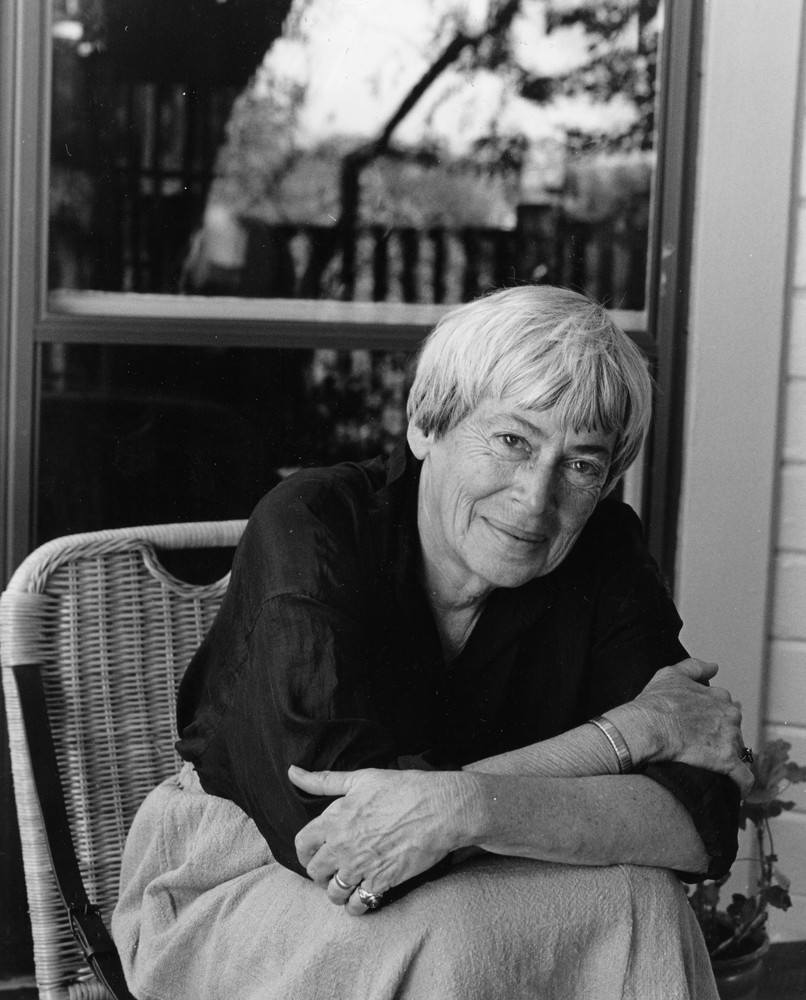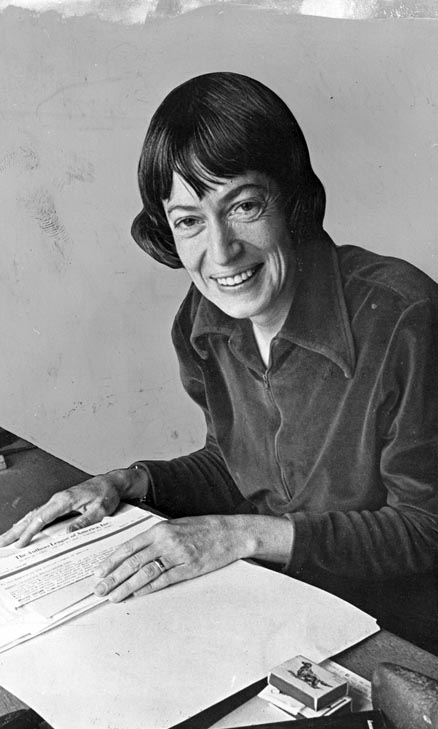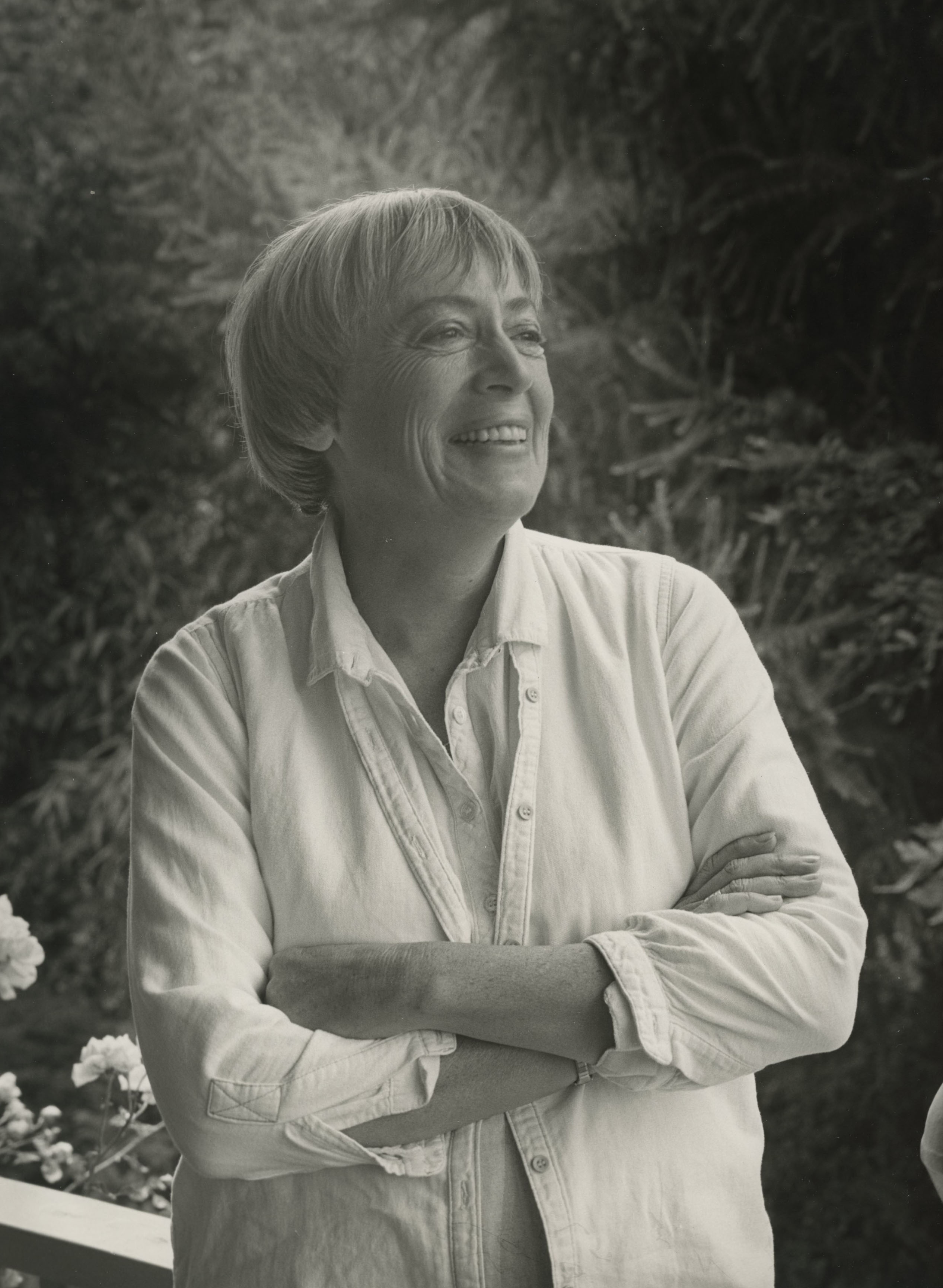Ursula K. Le Guin, one of Oregon’s preeminent writers, was born Ursula Kroeber in 1929 in Berkeley, California, the youngest and only girl in a family of four children. Her parents were Alfred Kroeber, a prominent and influential American anthropologist, and the writer Theodora Kroeber, widely known for her accounts of Ishi, the last member of the Yahi tribe in California.
The Kroebers’ redwood home in Berkeley was a place of books, music, storytelling, and discussion. Their summer retreat, an old ranch named "Kishamish" in the hills of Napa Valley, was a gathering place for scientists, writers, students, and California Indians. Mythology and legend were an integral part of the Kroebers’ family life, and Le Guin remembers that she "was brought up to think and to question and to enjoy."
Le Guin attended public schools in Berkeley, graduated from Radcliffe College, earned a Master’s degree at Columbia University, and began pursuing a doctorate in French and Italian Renaissance literature. In 1953, as a Fulbright Fellow steaming toward France on the Queen Mary, she met historian Charles Le Guin, also a Fulbright Fellow. They were married a few months later in Paris.
By 1958, the Le Guins had settled in Portland, where Charles took a teaching position at Portland State College (now Portland State University) and Ursula began her career as a writer. They raised three children. Ursula Le Guin once famously said: "One person cannot do two fulltime jobs, but two persons can do three fulltime jobs, if the work is honestly shared."
Early attempts to publish her fiction met with little success, and Le Guin's first published writings were poems. She describes her early fiction as "just a little off." The term "magic realism" had not yet found currency, and her stories were perhaps uncategorizable. When she veered explicitly into the critically unrespected genres of science fiction and fantasy, she found willing publishers. A time-travel short story, "April in Paris," appeared in 1962 in Fantastic Stories, and in 1966 the novel Rocannon’s World was published as half of an Ace Double paperback.
Le Guin published eleven books of poetry, five collections of essays and literary criticism, thirteen books for children, four works of translation, several plays and screenplays, the libretto for an opera, twenty-three novels, and twelve volumes of short stories—fiction in all its various forms, including realistic fiction. Still, her name is most often associated with the speculative works of the imagination that first introduced her to readers.
Critical appreciation for Le Guin’s work is near-universal. Brian Attebery, writing in the Dictionary of Literary Biography, describes Le Guin’s fiction as "extraordinarily risky...full of hypotheses about morality, love, society, and ways of enriching life, expressed in the symbolic language found in myth, dream, or poetry."
Among the most honored of contemporary American authors, she received a National Book Award, five Hugo Awards, five Nebula Awards, the Kafka Prize, a Pushcart Prize, the Howard Vursell Award of the American Academy of Arts and Letters, the L.A. Times Robert Kirsch Award, a Newbery Silver Medal, a PEN/Malamud Award, the Gandalf Award, a James Tiptree Jr. Retrospective Award, and the Boston Globe/Hornbook Award. In Oregon, Willamette Writers honored her with a Lifetime Achievement Award, and she received two Endeavour Awards from Oregon Science Fiction Conventions and the Charles Erskine Scott Wood Distinguished Writer Award from Oregon Literary Arts.
Her best-known fantasies, the six Books of Earthsea, have sold millions of copies and have been translated into sixteen languages. Her first major work of science fiction, The Left Hand of Darkness, is considered epoch-making for its radical investigation of gender roles and its moral and literary complexity. The Dispossessed and Always Coming Home revived and reshaped the forms of utopian fiction. Always Coming Home, in particular, opened up literary notions of what comprises a novel by including music, verse, and anthropological notations. Her novel Lavinia is a ground-breaking exploration of the boundaries between history and mythology, creator and created.
Several of Le Guin’s novels and stories make use of the Oregon landscape. Searoad, which won the H. L. Davis Oregon Book Award, is a collection of realistic stories involving the history and people of a small Oregon coastal community. The Lathe of Heaven is set in near-future Portland, and "The New Atlantis" envisions Oregon after an environmental collapse. "The Ones Who Walk Away from Omelas," one of Le Guin's best known and frequently anthologized stories, is a Jamesian fable that takes its name from the road sign for Salem, Oregon, read backwards.
LeGuin's novels and stories explore sexism, racism, nationalism, and the ambiguities of technological progress. Several of her works are informed by Taoist principles of duality, by Jungian concepts of dream and shadow, and by the anthropological and sociological concerns that were a formative part of her life. In recent novels, such as The Other Wind, she grapples with aging and death.
Le Guin is notable for her willingness to revisit earlier works in response to her own maturing thought and especially her growing feminism. Tehanu: The Last Book of Earthsea, for instance, written some twenty years after the original Earthsea trilogy, deliberately veered away from the male-centric heroism of the earlier books and toward the more "ordinary" heroism in the lives of women and children.
Le Guin taught writing workshops from Vermont to Australia, including those at Pacific University in Forest Grove and Portland State University, where she was a frequent teacher at Haystack, and at Fishtrap in Wallowa County. She was active in the literary and political community of Portland and Oregon, including joining peace vigils at Pioneer Courthouse Square and giving early support for both Fishtrap and Oregon Literary Arts. She was also a board member of Literary Arts and the Multnomah County Library.
Ursula K. Le Guin died in Portland on January 22, 2018.
-
LeGuin, Ursula.
Ursula K. Le Guin. Copyright by Marian Wood Kolisch
-
![]()
Ursula K. Le Guin with her books..
Oreg. Hist. Soc. Research Lib., bb004400
-
![]()
Ursula LeGuin, by Marian Wood Kolisch.
Courtesy Oregon Hist. Soc. Research Lib., Org. Lot 1078, OSA 1, folder 3
Map This on the Oregon History WayFinder
The Oregon History Wayfinder is an interactive map that identifies significant places, people, and events in Oregon history.
Further Reading
Cadden, Michael. Ursula K. Le Guin Beyond Genre: Fiction for Children and Adults. London: Routledge, 2004.
Cummins, Elizabeth. Understanding Ursula K. Le Guin. Columbia: University of South Carolina Press, 1990.
Spivak, Charlotte. Ursula Le Guin. Boston: Twayne, 1984.
"Ursula K. Le Guin. " https://www.ursulakleguin.com/.





